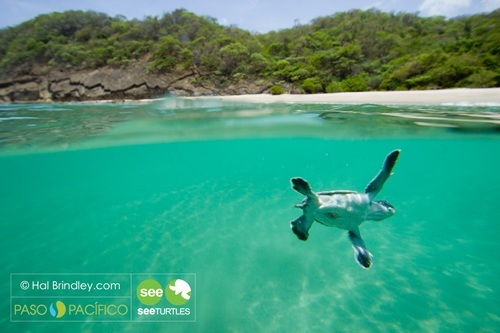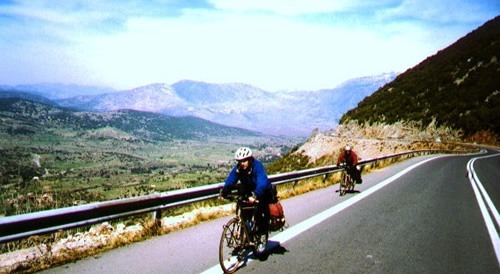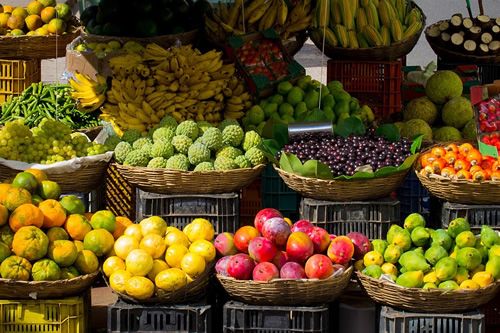How Travel Can Change the World
One Journey at a Time
Article by Dr. Jessie Voigts
Wandering Educator Contributing Editor for TransitionsAbroad.com
With ecotourism, ethical travel on the rise, and more awareness about responsible travel, traveling can sometimes seem like a landmine, with too many possibilities of doing something wrong. How do you know what to do? How can you find out more? What if you make a mistake? If you have to pay such attention, it’s like extra homework — that isn’t fun! Is it even worth going?
The answer is YES — combining ethical travel with pleasure is doable and worth doing. Not only is it good for the social and planetary good, but it’s also an authentic way of traveling that practices ethnorelativism and global awareness — something international educators not only promote, but spend their lives doing.
Here at Transitions Abroad, Jeff Greenwald has included a definition of ethical travel in his article Ethical Travel: Voting with Our Wings:
"Ethical travel is a more recent concept, and a more demanding one. It fulfills both individual and collective ideals. A traveler can experience environmental beauty and cultural immersion while actually contributing to the well-being of the host country."
Whether it is learning about the practices of training elephants (captured from the wild, tortured to become working animals, abused, and given horrific living conditions) and choosing to not interact with elephant tourism, paying a fair price for goods and services, learning about and respecting the culture, eating locally, or supporting local vendors, ethical travel is the epitome of ethnorelativism and global awareness…and it is definitely pleasurable.
Combining ethical travel with pleasure gives you a better time than ever. You interact more with locals, impact their lives and environment, and make a difference.
Any travel you do can be done ethically! Love food? Fashion? Animals? Surfing? Volunteering? Hiking? Music? Shopping? Beaches? All our travel passions can be enhanced by traveling ethically — by paying attention to the people, culture, and land wherever you are in the world.
I could go on all day about how important this is — but I decided to ask experts — all travel writers committed to ethical travel — whose articles, photos, and joy in travel all showcase the alignment of ethics and pleasure.
* * *
Hal Brindley, of TravelForWildlife, notes:
Holding high ethical standards and having fun on your travels are definitely not mutually exclusive. In fact we find quite the opposite to be true. Once you open your mind to the impacts of your travels, you realize that you're not having fun when you know that something you're doing has a negative effect, and that you have so much more fun when your activities and choices are having a positive effect!
Everybody loves to be close to wildlife and they get a personal thrill from the experience, but there is clearly a right way and a wrong way to do it. We ask ourselves a few simple questions, like "Is the animal doing this by its own choice or is it being coerced by humans? How is this activity helping conserve the species? Am I doing this for my own entertainment or to help this animal?"
When I wind up in a huge resort that may look beautiful but has clearly wasted huge areas of natural habitat, I never enjoy myself. But when I find myself in a small, carefully managed eco-lodge that works with the environment and wildlife, I invariably have a wonderful time. Likewise when my activities actually benefit the local wildlife, they are far more fun and satisfying. For example I just joined a "conservation vacation" with SEE Turtles in Costa Rica, and the fact that I got to participate in a meaningful way with mangrove reforestation, dolphin research, and sea turtle conservation, made the trip twice as fun as if I had just wandered through those areas as a tourist. How many people get to say they were slapped in the face by a sea turtle on their travels? But that's exactly what happened to me as we were turning over an adult female green turtle to take her measurements and information when we participated in scientific field research in the Golfo Dulce. And I love every second of it!

|
|
Turtle in Costa Rica. Photo courtesy and ©Hal Brindley.
|
* * *
Diana Edelman, of DTravelsRound, notes:
Traveling to Thailand and spending a week volunteering at Elephant Nature Park was one of the most memorable (and life-changing) experiences of my life. The park, along with the foundation which runs it — Save Elephant — is a glowing example of responsible tourism. Here, it is about learning about the elephants who call ENP home and their rescues from the tourism industry, street begging and more, and how to appreciate them from a distance versus riding them or watching them perform. I now work for Save Elephant Foundation and can easily say that in the two years I have been here, I have learned so much about elephant tourism and spoken with so many people who tell me they would much rather visit places like ENP where the elephants get to roam free and no bull hooks are used, than sit on a bench on their back or watch them paint or kick soccer balls. I have seen, first hand, the results of unethical elephant tourism, and it breaks my heart. Fortunately, more and more outfits are beginning to take a cue from ENP and move towards responsible elephant tourism versus exploitive.
* * *
Ethan Gelber, of The Travel Word, notes:
Choosing to be "ethical" is often misunderstood by others as being "boring." That is, more than anything, a reflection on the speaker. All you are doing is choosing to take into account considerations other than your own personal satisfaction.
Way back in 1997-1998, I led a nine-month bicycle circumnavigation of the Mediterranean Sea, from Morocco to Gibraltar the long way around. Guided by an ethical vision — "in the interest of greater peace and cooperative understanding" — BikeAbout-the Mediterranean was a pioneering "educational internet adventure" in the days long before blogging had caught on. In retrospect, although we made some silly choices along the way and went through some tough times in defense of our ethical underpinnings, the trip remains one of the richest, most unforgettable and most pleasurable travel experiences of my life. Traveling by bicycle about the Mediterranean, we made a series of programmed visits to schools, clubs, and private or public organizations, using each stop with (sometimes very) local communities to demonstrate new computer and internet technology, but also to collect and disseminate knowledge about contemporary lifestyles for use in digital curricular materials.
Inspired by my own adventures, the most inspiring explorers I can think of today — whether professional, amateur or incidental — are those who choose to travel slowly and usually under their own power; to throw themselves wholeheartedly and without judgment into the midst of nature and culture; to marvel at local knowledge and ingenuity; and to celebrate chance encounters with the kind of generosity and hospitality that gives us hope for the future. Although anchored in ethics, none of that sounds boring to me!

|
|
Bike adventure. Photo courtesy and ©Ethan Gelber.
|
* * *
Leigh Shulman has some specific tips about visiting Argentina:
For touring, instead of a tour, rent a car from one of the local car places then drive down to Cafayate. That lets you stop at and hike the geological formations along the way. Local artisans sell hand-made jewelry, pottery and the like in these places, too. In Salta, Argentina, you can also stop at Posada de las cabras, which has the best desserts around, all made from goat's milk and cheese from the goatherds on the property.
I love that place. I do all my shopping there, and I try to go back to the same person. The vegetables are excellent quality, very fresh and grown locally. It's also super cheap and everything you cook with it tastes amazing.
I always encourage people to rent an apartment with kitchen, buy food at the market and cook for themselves. Living locally? Both ethical and pleasurable.

|
|
A fruit market.
|
* * *
Talon Windwalker, of 1dad1kid, notes:
When we travel, it’s up to us to be aware of the local culture, the mores, expectations, and some of the basic laws of our host country. We need to remember that when we are in a foreign country we’re guests, and we really should act like good ones.
You're not at home. That’s kind of the point, no? I mean most people travel to experience new things, places, and foods. So don’t expect that every place will try to make you comfortable. For me, part of the fun of travel is being forced out of my comfort zone. For example, I get a big kick out of ordering food when I have absolutely no idea what it is.
I understand not everyone is that adventurous, but I often hear travelers speak with a tone of disgust when they talk about the foods they can’t find, among other things, which I find ridiculous.
If your goal is to experience a place, then I’d like to encourage people to not only visit the big tourist attractions but to also get out and see more of the neighborhoods, hunt down where the locals eat and play, and so on.
Try to make your time in a location as multidimensional as possible. Trust me, you'll enjoy it.

|
|
Night market in Ayutthaya, Thailand. Photo courtesy and ©Talon Windwalker.
|
* * *
Jim O’Donnell, of Around the World in 80 Years, notes:
Ethical travel comes in many forms. While it can mean a rough and tumble outing in the wilderness, more often than not ethical travel is a comfortable and somewhat organized enterprise. Think of the birding resorts in Costa Rica where you can find a range of comfort levels from the simple to the luxurious but all with comfortable accommodations and impressive food.
It is more than just bird watching, archaeological sites or turtles laying eggs. Ethical travel requires a positive impact on the human community of an area. People who are well paid and employed in an ethical travel industry are much more likely to support that industry and protect the things that give them the ability to feed their families.
Ethics and pleasure go hand in hand. Not only are the creature comforts offered by most eco and ethical travel a fine addition to any trip, but so is the pleasurable satisfaction of knowing that your tourism dollars are going to benefit and preserve the very people and things you came to see.
I think you’ll agree with these ethical travel experts that this type of travel is not only pleasurable but can change travel the way we know it. The choice between ethics and pleasure in travel is not an either/or proposition; it results from a false dichotomy many of us can and do overcome.
Dr.
Jessie Voigts is the publisher of Wandering
Educators, a travel library for people curious
about the world. She’s published
six books about travel and intercultural learning,
with more on the way. You can usually find her family
by water — anywhere in the world.
|
